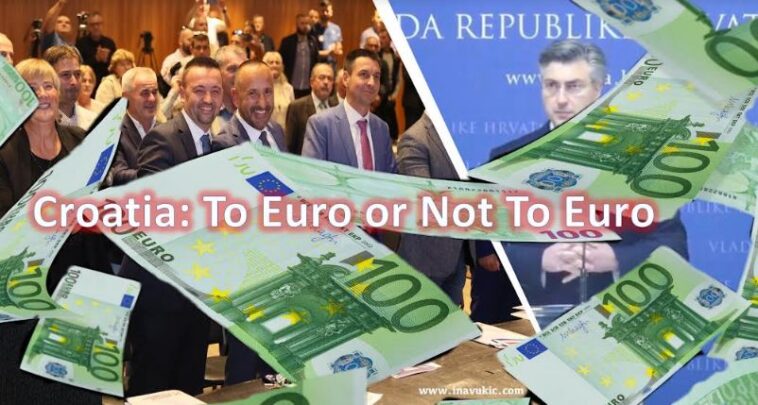Since Croatia set on the path of independence from communist Yugoslavia in 1990 its citizens have held only three referendums: independence referendum in May 1991, referendum to join (or not) the European Union as member state in 2012 and the referendum for the definition of marriage (between a man and a woman) in 2013.
In 2013/2014, 650,000 signatures were collected in Croatia for the initiative introduced by the Headquarters for the Defence of Vukovar Association to hold a referendum regarding the Cyrillic (Serbian) script in Vukovar. That is, a referendum seeking the exclusion of the Cyrillic script as a second official script/language on public buildings and institutions etc in Vukovar. The referendum was abandoned due to Constitutional Court’s ruling that such a referendum question could not asked as it would severely compromise the rights of minorities under the Croatian Constitution living in Croatia.
In 2018 a referendum was planned, and signatures collected in Croatia on three questions related to changes in electoral legislation and the cancellation of the Istanbul Convention, but this pre-referendum signature collection ended in agony and scandal with claims from the government agency engaged in counting the votes, APIS, that over 40,000 signatures were invalid, including double signatures. The referendum initiating and organising group “People Decide” complained and demanded an independent recount of votes, however this process did not eventuate as claims of ballot papers’ being destroyed arose besides apparent resistance from authorities to permit a recount.
Come 2021 and the socio-economic surrounds for another referendum of key significance for Croatia emerge, with politics hotting up just as they did in 2011 and 2012 ahead of the European Union membership referendum. This new referendum would seek to clarify whether Croatia should abandon its beloved monetary currency unit Kuna and adopt the Euro.
Since 2004 Croatia had a bumpy ride to its 2013 achieved status as EU member state. This bumpy ride particularly saw parts the international community collaborating with some ex-communist Yugoslavia Croatian operatives fabricate evidence to attempt a criminalisation of Croatia’s Homeland War in defence from brutal Serb aggression. This bumpy ride included the equating of victim with the aggressor. This bumpy ride included an increased stacking of Croatia’s public service posts and positions of power with former communists and/or their descendants. Hence, an anti-EU membership mood that became visibly prevalent in by 2010 and the government, obviously fearing that the EU Membership referendum would fail if the Constitution was not changed went on to change the Constitutional law governing referendums.
That is, the section dealing with Referendums in 1990 stated that the referendum is decided upon by the majority of votes but under the condition that a majority of the total voter numbers vote in the referendum and this was changed in 2010 whereby majority of total voters were no longer required to turn up at voting but the question asked in the referendum is decided on the basis of majority vote out of the total number of people who turned up to vote. And so, we had the situation that in 2012 the majority vote out of the dismal 28% of total voters turnout decided that Croatia should become an EU member.
Having been through the process of public consultations/submissions since the beginning of this year the government of Croatia is currently bringing before the parliament its proposal for changes to the Constitutional law governing referendums. The government claims that its proposed changes will being an improvement in the vague legislative framework of the referendum institute. That the new legislation will be harmonised with the Constitution and ensure transparency and openness of its implementation. Citizens should have a more effective influence in the political decision-making process, the government claims.
The changes proposed include that Local self-government units are obliged to provide places for collecting signatures for referendum initiatives, depending on the number of inhabitants in that local self-government unit. Parliament also undertakes to call a referendum within 30 days (instead of the current 15) after the Electoral Commission determines that enough signatures have been collected.
Whether, if passed into law, limiting referendum polling places to government offices only (not city squares, schools, or parks also) is the most voter-friendly part of the referendum process is a moot point and its clarification is bound to appear if a referendum is held after the parliament passes the proposed changes to the legislation. Certainly, experience would suggest that limiting polling places to government-controlled venues will always deter many voters from turning up at the polls in fear of government control and corruption.
Conspicuously missing from the proposed changes to law governing referendums is the fact that the proposal does not include any possibility of scrutinising or observing the counting of votes in the referendum voting processes despite the bitter experiences of the 2018 referendum attempts that were often described as corruption and manipulation of public votes.
Croatia’s Prime Minister Andrej Plenkovic has announced that his government will introduce Euro as Croatia’s official monetary currency during 2023. He has also reminded the public this month that the process of joining the EU in Croatia enjoyed the support of all participants in the political scene and made it clear that there would be no referendum on the Euro.
“It was seen in the process of EU accession negotiations and in the referendum,” said the Prime Minister, adding that 150 MPs voted in favour of joining the Union at the time and that he believed that the issue was resolved by referendum and vote in Parliament. “Croatia then legally and politically undertook to join the eurozone,” he said. Plenkovic also stated that those against introducing the Euro to Croatia had done nothing for the process of Croatia achieving membership in the EU.
Let’s keep it real, Prime Minister!
Plenkovic’s statement that those against the Euro had done nothing for Croatia’s membership in the EU appears scandalous and certainly not true because Croatia became a member of the EU as an independent state created and fought for in a bloody war by multitudes of those who do not want to give up the Kuna and embrace the Euro. The people who fought for and sacrificed their own lives and for an independent Croatia have an absolute right to fight to retain a potent symbol of their suffering for freedom from communism – the Kuna!
Hence, the Prime Minister Plenkovic is wrong in insisting that there would be no referendum regarding the Euro. Not all EU member countries are also members of the Eurozone and therefore, this evidences the option that membership in the EU does not oblige its members to also become members of the Eurozone.
As the date of the apparently imminent introduction of the new currency approaches, such a possibility is gaining more and more public attention, which, as with EU membership for example, is divided. Some are in favour of the introduction of the Euro because they believe that it will stabilise Croatia and help its further development and investments. At the same time, others strongly oppose the announcement because they fear an increase in the prices of everyday necessities and an additional drop in citizens’ standards.
Croatian Sovereighnists party, headed by Hrvoje Zekanovic MP, which is part of conservative opposition parties in the Croatian Parliament, has launched the organising of a referendum on the adoption of the Euro in Croatia and they are against the Euro and against Croatia being a part of the Eurozone. They state that their main reason for wanting to protect the Kuna, to keep it is in the fact that national currency and the management of its exchange rate is one of the key parameters of influencing the economic development of the country, so this parameter should remain in the hands of the Republic of Croatia and its citizens, for whom Croatian interests are a priority.
No date is in sight as to when the referendum process will commence but one may safely say it will be during 2022. Furthermore, it is anticipated that it will take several months for the new legislation regarding referendum changes to come out the other end as passed. Hence, the initiative for a referendum and the government’s insistence that there will be none, is surely to bring in a great deal more of political unrest and disagreements in Croatia, including bitter clashes between citizens who tend to see the adoption of the Euro as the hated last straw that will break the back of the pride rightly held for the glorious victory over the Serb and communist aggressor during the 1990’s.
Prime Minister Plenkovic keeps telling the Croatian public that the adoption of the Euro will increase the standard of living at a greater rate than any increases in prices. The opponents of the Euro in Croatia state that this is not the time to adopt the Euro in Croatia as that currency is good only for the wealthy countries, those in the EU with a much higher standard of living, that the rounding off of prices is bound to occur with the introduction of the Euro and thus be detrimental for Croatian citizens. Also, on the side against the Euro many say that the Eurozone is an unsafe conglomerate and if it falls apart the poor Croatia will be placed in the situation of having to contribute to the repair and bailing other countries, such as Greece and Italy, out of a debt crisis, as their losses in this event could surface after the Coronavirus pandemic as being astronomical. The greatest complaint against the Euro appears to be the widespread belief that by losing its national currency Kuna, Croatia will lose a great deal of its hard-earned sovereignty, paying for it with rivers of blood and devastation.
And at the end of the day a referendum regarding the Euro should be held in Croatia if because of nothing else then because only 28% of total Croatian voted at the EU referendum in 2012 and barely 67% of those voted Yes to Croatia’s EU membership. A referendum on the Euro could indeed be a great test for the Croatian citizens regarding their experiences and trust as members of the EU as opposed to national sovereignty and retention of values from the Homeland War. Ina Vukic




